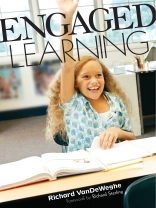’No other book on teaching has excited me as much as this one. It should be the core text for prospective teachers in any field.’
—Jonathan Potter, English and Drama Teacher
Camden Hills Regional High School, Rockport, ME
’Van De Weghe presents powerful instructional practices to help students use both their hearts and their minds in learning.’
—Louann Reid, Professor
Colorado State University
Spark genuine enthusiasm in your classroom by engaging students′ hearts and minds!
To generate truly compelling learning experiences and increase retention of new information, educators need the knowledge and tools to engage students from both a neurological and humanistic perspective.
Richard Van De Weghe provides an inside look at what happens in students′ minds and hearts when they are engaged and ’in the groove.’ Based on Mihaly Csikszentmihalyi′s idea of ’flow’—a state of intrinsic control, curiosity, interest, and inquiry that is the ultimate experiential goal for learning—this book provides holistic strategies for encouraging students to become motivated, engaged learners. Teachers will find:
- Information on brain function and memory pathways
- Spiritual and emotional principles of the heart that influence learning
- Strategies for guiding open-ended discussions, quality questioning, and teacher modeling
- Immediate, practical applications for language arts, science, math, and social studies
- Vignettes illustrating effective teacher dialogue and classroom involvement
Engaged Learning is a clear, concise, and elegant resource that helps teachers understand what it means to be a highly motivated learner.
Innehållsförteckning
Foreword by Richard Sterling
Preface
Acknowledgments
About the Author
Part I. Flow, Minds, and Hearts
1. Engagement as Flow
Engagement
Engagement as Flow
The Conditions of Flow
2. Engaged Brains
#1: Brains Search for Meaning
Looking for Meaningful Patterns
Constructing Personal Theories
Paying Attention in Personally Significant Ways
#2: Emotions Drive Brains in Learning
#3: Engaged Brains Engender Mind-Body States
3. Engaged Hearts
#1: Mindfulness
#2: Unity
#3: Compassion
4. Engagement and Instructional Practice
Decisions About Engaged Learning
Brain Decisions
Heart Decisions
Flow State Decisions
A Way of Thinking
Part II. Teaching for Engaged Learning
5. Modeling Engaged Learning
Teacher Modeling
Modeling Habits of Mind and Heart
Modeling Work Habits
Thinking
Writing
Reading
History Class Revisited
6. Using Words That Support Engaged Learning
Talking About Learning
Noticing and Naming
Identity
Agency
Generalizing
Knowing
Democratic Learning Community
Talking About Intelligence
Fixed Intelligence
Malleable Intelligence
Talking About Intelligence
Intelligence Praise
Science Class Revisited
7. Using Discussions to Engage Learners
Engaging Ideas
Engaging Questions
Engaging Silence
The Dynamics of Engaging Discussion
Biology I Revisited
8. Supporting Engaged Readers
Engaged Reading
Trinal (Three-Part) Approaches to Reading
Before-Reading Comprehension Strategies
During-Reading Comprehension Strategies
After-Reading Comprehension Strategies
Carmen and School Reading
9. Supporting Engaged Writers
Engaged Writing
Purposes for Writing
Audiences for Writing
Forms of Engaged Writing
Teachers Respond to Engaged Writing
Courtney and School Writing
10. Promoting Engagement Through Memory Pathways
Memory Pathways
Semantic Pathways
Episodic Pathways
Procedural Pathways
Emotional Pathways
Spatial Pathways
Multiple Memory Pathways
Engaged Remembering in Ms. Gonzales′ Classroom
Afterword: Lingering Questions
What About Assessment?
What About Classroom Research?
What About Study Groups?
What Now?
References
Index
Om författaren
Richard Van De Weghe is an associate professor of English at the University of Colorado Denver. He has taught middle school and high school, he has been a faculty member at two universities, and he is a field director for the National Writing Project. He has directed two sites of the National Writing Project; supervised preservice teachers in the Initial Professional Teacher Education program at the University of Colorado Denver; and worked with practicing teachers in numerous schools and districts on reading, writing, and thinking across the curriculum. Van De Weghe has been awarded Teacher of the Year at the University of Colorado Denver, where he was also named a President′s Teaching Scholar. He was selected as Outstanding Educational Leader (1992) by the Colorado Language Arts Society, and he was a recipient of the 2006 National Network for Educational Renewal, Richard W. Clark Partner School Award.His research interests concern theoretical and empirical issues that inform instructional practice—engaged learning; reading, writing, and thinking across the curriculum; teacher education; teacher professional development through inquiry; and the intersection of brain research and humanistic education. He has published articles in such resources as Educational Leadership, Phi Delta Kappan, English Education, English Journal, and the Journal of Teaching Writing. He was writer and column editor for the ’Research Matters’ column for English Journal for six years. He has presented workshops and papers for the National Council of Teachers of English, the National Writing Project, College Composition and Communication, Modern Language Association, and the Australian Reading Association.Van De Weghe has a bachelor’s degree in English and speech education from Western Michigan University, a master of arts degree in English from Michigan State University, and a doctorate in English with a specialty in the teaching of writing from Michigan State University.












